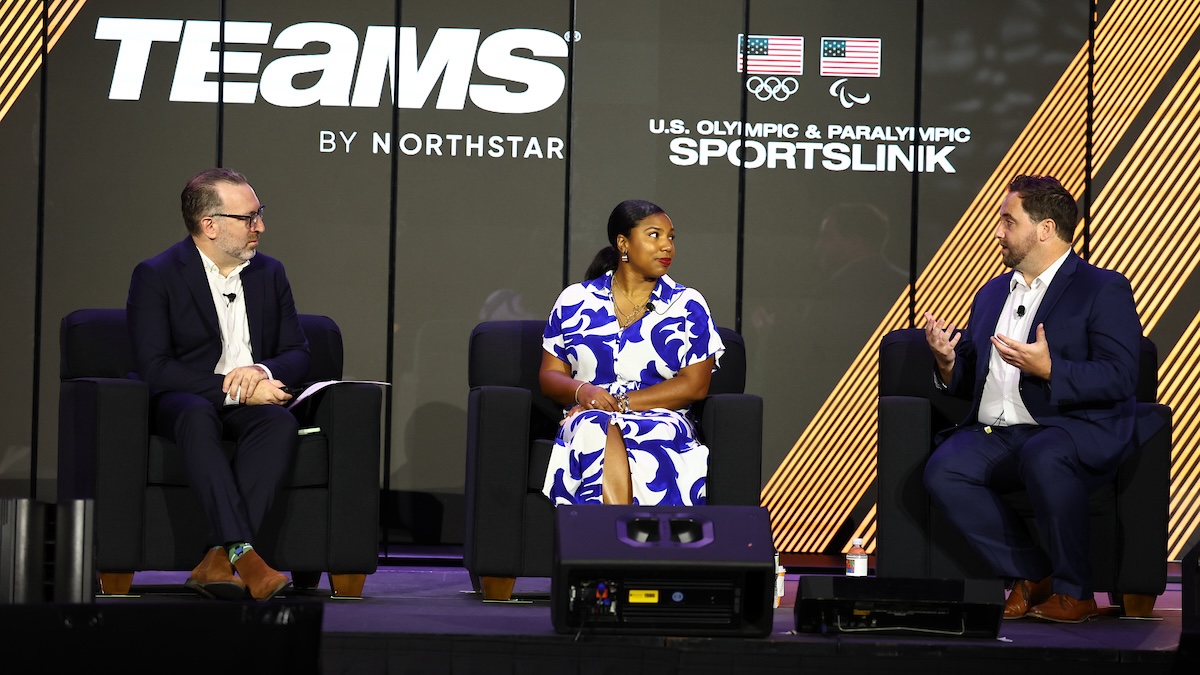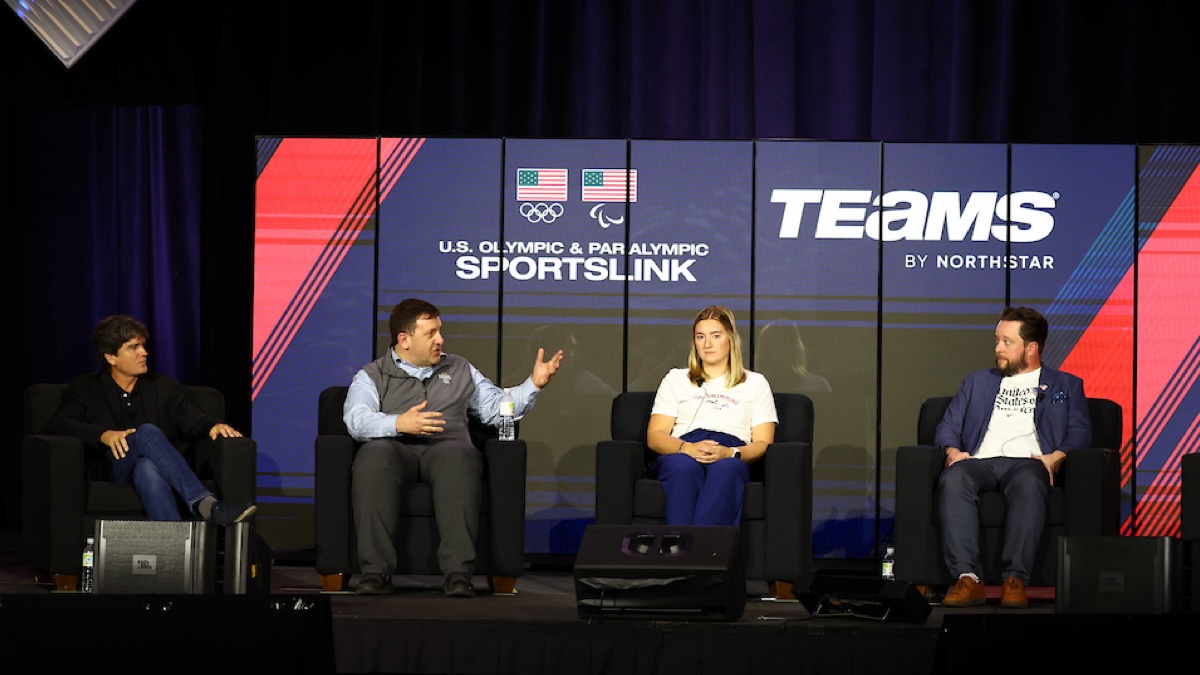
In a year when women’s sports have had a breakthrough, one project stands out above the rest. Earlier this year, the KC Current of the National Women’s Soccer League opened the first stadium in the world devoted to a professional women’s sports team. In this session, hear from team and destination leaders on how the CPKC Stadium got built, what the team has experienced since, how the city has marketed the complex and what the venue could mean for women’s sports moving forward.
This session was sponsored by Vibrant Arizona.
The Speakers
Sponsored Content
Derek Byrne, Director of Content Strategy, Visit KC: Byrne is responsible for marketing and communications efforts in support of many major sporting events hosted by Kansas City, including service on the local organizing committee for the Big 12 Basketball Championships, facilitation of the 2023 NFL Draft’s social media command center, and the expansion of KC’s international media presence in advance of FIFA World Cup 26.
What They Said
Stefanie Tomlin: “It’s not just the first women’s stadium, it’s also the first training facility specifically for women’s soccer. The stadium is the crown jewel of the area, which is an $800 million investment. We have different socioeconomic areas around the stadium and we’re trying to drive accessibility… The team has galvanized the city and it’s an electric atmosphere for the fans and players. We see our facility as a huge selling point to attract players, and their state of play has been reflective of their feeling about their new house… This is more than a spiritual experience, it’s also a great business plan. I’m giving tours to teams from all over the world, and we control our sponsors and our marketing. We don’t get booted for a concert like other teams might at other venues, because we control everything. I think we’re going to see a lot more places investing in women’s sports facilities. We’re the first, but we won’t be the last.”
Derek Byrne: “The stadium has been transformative to the way people experience downtown Kansas City as a whole. People are out enjoying and exploring the city before and after the games. Some of it is organic, but the team has been thoughtful and intentional about getting people out to the stadium and making it easy for them to do so. People meet at restaurants and breweries and walk to the stadium together… Not only is it groundbreaking, but also beautiful, functional, convenient, and can host any event. We’ve seen concerts, farmer’s market, pop up community events, and private events. As the destination, we’ve had the obligation to treat this stadium the same way as we would as any other stadium in the city.”

Destinations Discuss the Impact of Hosting Olympic/Paralympic Trials
This past summer saw not only the Olympic and Paralympic Games but a series of Trials held in destinations throughout the United States. The Trials are not only important athletic events, they give cities big and small the chance to capture the Olympic and Paralympic magic. As the next cycle turns to the United States, those involved with the events discuss what went well and how destinations can capitalize on opportunities leading up to the Los Angeles Games.
The Speakers
Macie McNichols, Senior Manager of National Technical Events, USA Swimming: McNichols oversees the planning and execution of USA Swimming’s Championship and National Technical Events. Most recently, she supported USA Swimming’s vision and efforts of hosting a U.S. Olympic Team Trials in an NFL stadium — the first of its kind.
David Hepp, CEO, Montgomery Whitewater: Hepp is a former Team USA athlete with the Canoe/Kayak Whitewater Slalom Team. He has spent the last 20 years opening and operating whitewater parks. He has previously held positions as paddlesports director with the U.S. National Whitewater Center, vice president of RIVERSPORT Adventures with the Oklahoma City Boathouse Foundation.
Joe Gesue, Senior Vice President, NBC Olympics & Paralympics Editorial, Partnerships and Programming & Executive Editor, NBC: Gesue oversees all Olympic and Paralympic programming, the editorial research department, and has worked on the past 12 Olympic primetime shows (2000 through 2022). In addition to programming and editorial, he also works on Olympic and Paralympic project management, strategy, relationships and sales partnerships.
What They Said
Scott Cole: “With the Olympics taking place sooner in 2028, it affects all of our events that year for USA Gymnastics. We’re going to have to start looking at all cities that have the infrastructure that we need. It also puts us right on top of NBA and NHL playoffs, so those traditional arenas may not be available to us. We have to think outside the box and get some bids from places that we’ve never seen before… The only place we want to go is up and continue to grow the sport and get more people excited. When we’re choosing a city, we’re looking for somebody we can get into the trenches with and make the best possible experience for the athletes.”
Joe Gesue: “We had to start thinking a little differently about our coverage of the Paris Olympics, especially about the time zones. The question was how do we show the action all day long live, but then make sure to draw people at primetime as well? We wanted to make it a pop culture moment, and we didn’t want to wait until July 26 to get started, so we got it going during the Trials with celebrities being involved… The atmosphere is super important, and it’s a true partnership between us and the NGB and the city. Having that energy and attracting fans to the Trials then shows the audience at home that this is a big, exciting event that everybody wants to be at.”
David Hepp: “We got the park open in July 2023 and then decided to take a run at the Olympic Trials. We got together with the county and a lot of leadership around Montgomery and the state of Alabama. We needed help and support to put an event like this on being such a new venue. But we knew we needed to do it, and the venue is phenomenal. It took a whole group of us — a whole new staff — to pull this off in a matter of about four months. We had 5,000 people come through, which is a big crowd for a facility that’s 14 months old… Whitewater events are completely unheard of in Alabama. We want to get our local kids out in the water and show them there are sports other than the traditional ones.”
Macie McNichols: “It took two years of planning to figure out how to build a pool in an NFL stadium, because it had never been done. We had not only record-breaking performances in the pool, but nine days of activities for fans around the city. There were countless meetings and planning sessions and trips to Lucas Oil that went into making that event happen. It’s a team effort and you have to rely on the people around you — the city and sports corp you’re working with. You have this event and it sets a high bar.”












 Copyright © 2025 by Northstar Travel Media LLC. All Rights Reserved. 301 Route 17 N, Suite 1150, Rutherford, NJ 07070 USA | Telephone: (201) 902-2000
Copyright © 2025 by Northstar Travel Media LLC. All Rights Reserved. 301 Route 17 N, Suite 1150, Rutherford, NJ 07070 USA | Telephone: (201) 902-2000